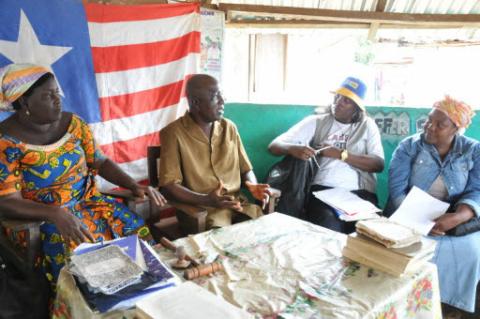
Liberians have, historically, struggled with severe shortcomings in access to quality healthcare, a challenge that was brought into focus and accentuated by the recent Ebola crisis.
The country’s health sector is highly dependent on external resources, which account for some 55% of healthcare spending. In 2013/2014, 35% of healthcare costs were covered by the patients themselves, with a large share born by the poorest. In 2015, the country faced a 77% stock-out of essential drugs at health facilities.
These challenges notwithstanding, a brighter future for the country is in sight and within reach. The country’s government, with support from the EU-Luxembourg-WHO Universal Health Coverage Partnership (UHC-P), recently decided to take bold action towards improving the accessibility and quality of healthcare for the whole of Liberia.
“It all started with President Ellen Johnson-Sirleaf’s ambitious plan to introduce free healthcare for all in her country,” said Eric D. Johnson, National Professional Officer for WHO in Liberia. “But ways and means had to be found to make this endeavour financially sustainable.”
The government established a task force which, with support from the UHC-P, undertook a number of fact-finding visits to countries including Tanzania, Ghana and Rwanda, in order to gather lessons learnt and best practices on health financing mechanisms.
Among other key findings, the three country examples showed that point-of-service, community-based, and national-level policies have been effective in increasing enrollment into health insurance or equity funds – and that an exemption policy must be implemented in tandem with an identification strategy for the poor in order to meet the equity objective.
This evidence and the resulting task force reports led to the refinement of the scheme which was expected to be launched a few years ago, but was deferred due to the outbreak of the EDV. The Liberia Health Equity Fund (LHEF) is intended to create a sustainable health financing system that guarantees equal access to quality healthcare and ensures financial protection for all Liberian citizens.
The LHEF is based on three core principles:
- Sustainability: Generating domestic revenues for health.
- Efficiency: Harmonisation of health sector financing; paying for outputs.
- Equity: Additional funding from earmarked taxes can be used to cover premiums of the poor.
Although the process of formalizing the LHEF’s legal act came to a halt when Ebola struck, consolidated efforts made by the government and the international community to tackle the crisis provided WHO with a “unique opportunity to advocate for taking up the work again as part of the UHC-P-supported Ebola recovery plan,” said Eric D. Johnson.
The Ministry of Health advanced these efforts by making a presentation to the president’s Cabinet in February 2016, aimed at convincing the government to back the scheme. As a result their successful advocacy, the president established a new LHEF task force headed by the Minister of Finance.
“The momentum is now there to implement the roadmap step by step,” Eric D. Johnson affirmed. “Our priority in the coming weeks will be to formalize the legal act before establishing an adequate structure and recruitment process for implementing the scheme.”
The LHEF’s main characteristics can be summarized as follows:
- Mandatory contributions from the formal sector;
- Direct contributions from the non-poor informal sector;
- Government subsidies could be channeled into the fund;
- Donor funding could contribute to the fund; and
- Providers are paid on the basis of meeting targets (i.e., “pay for performance”).
With regard to next steps, Liberia’s government will need to elaborate a strategy to define the target population for exemption from mandatory contribution to the scheme, assess the level of cost recovery, identify the types of health facilities to be included and monitor facilities managing their own accounts. Other important considerations for the government include the introduction of individual cost sharing (e.g., through a revolving drug fund at the community level), the endorsement of the IHP+ compact which aligns donor and partner support in the health sector, and the development of a resource allocation formula for beneficiary counties.
According to Eric D. Johnson, the role of the private sector as a potential contributor to the LHEF should also be explored: “We do not have many private health insurance providers in Liberia,”, he said, “but if the LHEF works, the private sector may buy into it.”
In order to support the LHEF roadmap, the UHC-P Phase III country roadmap in Liberia will be tailored to offer the complimentary technical assistance and policy dialogue support needed to carry out the next phases of planning and piloting for the scheme.
